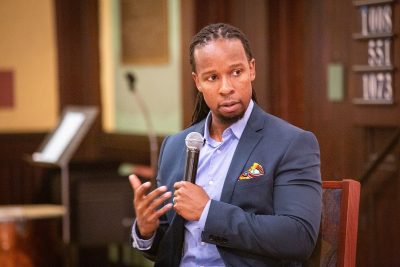
Rep. Ayanna Pressley, D-Mass., Ibram X. Kendi, director and founder of the Boston University Center for Antiracist Research, and Rep. Barbara Lee, D-Cali., hosted a Facebook Live event to discuss antiracist policymaking Thursday evening.
The three discussed the need for antiracism in public health, voting, criminal justice and environmental policy.
Pressley began by discussing her and Lee’s Antiracism in Public Health Act that would require the federal government to make antiracist health policy and combat police violence with a public health approach.
“It recognizes the simple truth,” Pressley said. “The government will never be able to confront racial disparities until it confronts and actively dismantles systemic racism.”
Kendi discussed the health disparities COVID-19 caused in communities of color and how “racist policies” were the catalyst.
“I think, for far too long, we have blamed Black and brown people for the causes of disparities and inequities,” Kendi said, “not realizing that when we’re doing that, we’re being racist.”
Kendi said health disparities have existed before COVID-19 — communities of color have higher rates of heart disease, cancer and respiratory disease.
“This is a serious problem, and without question we should be recognizing that racism is a public health emergency,” he said.
Kendi went on to talk about his definition of antiracism and said it is not “fixed,” but rather something one should aim to achieve.
“I define antiracist as someone who is expressing an idea of racial equality or supporting policy that leads to racial equity and justice,” Kendi said. “No one becomes antiracist, this is what we can strive to be based on what we’re saying and doing.”
Kendi and Pressley also discussed Pressley’s amendment to HR-1 to lower the federal voting age to 16.
“The younger, the better,” Kendi said, “It’s then going to allow more Black and brown folks to vote, and thereby bring a greater sort of sense of multiracial democracy to this country.”
Lee noted approaches to antiracism in terms of a “radical reimagining” of the criminal justice system.
“We’ve got to have restorative justice,” Lee said, “which means whatever education, workforce training, health care, housing, everything to help repair the damage of these racist policies.”
Kendi also commented on criminal justice and cited the difference between racist and antiracist policies: antiracist policies lower racial inequalities while racist policies maintain them.
“I think that would simplify a lot but of course, it’s hard to prove the intention,” Kendi said. “It’s very easy to prove the outcome.”
Lee said she got into environmental policy because she grew up in a Latinx and Black neighborhood that was right next to a smelter — and factory where metal is extracted from ore.
“We started looking at environmental racism and how these toxic sites are located in our community,” Lee said. “How companies come in without even any community involvement and land in our communities.”
The pollution from the smelter caused long-term health problems for her family and many others in the community.
“We end up paying the price because of the public health consequences of pollutants and environmental toxins,” Lee said.
Pressley ended the talk by expressing her gratitude for all who attended the panel.
“Please remember to be kind to yourselves, nurture your spirit,” Pressley said. “Be as radical and bold in the work of liberation, and equally as radical and bold in Black joy and healing.”
























































































































BLAKEW • Feb 6, 2021 at 11:49 pm
““The younger, the better,” Kendi said,”- That is all we need to know. How about the age of 4? Would that meet Kendi’s vision? This guy is so phony. He can fool a few academics and “progressive” journalists and that is about it. Please do not speak for “brown”- you do not represent or understand latinos, their experiences, and pathos.
Kevin Neuschatz • Feb 6, 2021 at 11:26 am
Seriously, this guy gets paid to whine about disparity in health care??!!